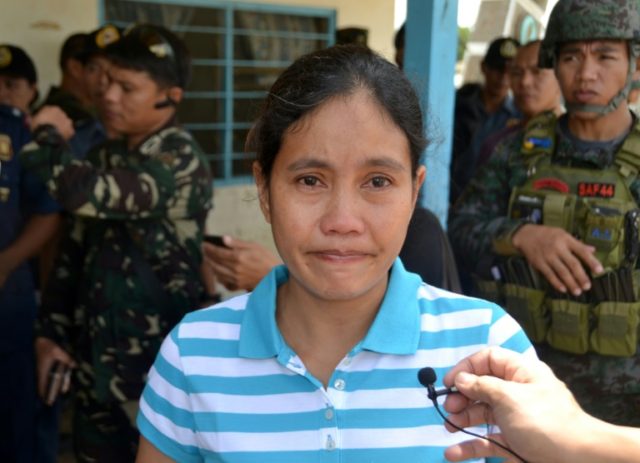Manila (AFP) – A Filipina hostage released by southern Philippine militants on Friday broke down in tears as she recounted how her Canadian boyfriend had been beheaded a week earlier.
Marites Flor was abducted in September by Abu Sayyaf militants, along with three others, two of whom — Flor’s partner Robert Hall and fellow Canadian John Ridsdel — were killed.
Flor cried as she recounted how the kidnappers led away Hall to be beheaded after a ransom deadline lapsed last week. Ridsdel had been killed in April.
“It was painful to see them so happy before they did the beheading. They just put handcuffs on him and took him out,” she said.
The four were seized in September aboard yachts at a tourist resort on Samal island, about 500 kilometres (300 miles) to the west of Sulu, known as a hideout of the militants.
On Friday, Flor was dropped off at dawn outside the house of a local politician on Sulu, provincial police chief Wilfredo Cayat told AFP.
Incoming Philippine President Rodrigo Duterte has said he and his aides were “able to negotiate” for her release.
Duterte says he is currently trying to secure the release of the fourth hostage, Norwegian national Kjartan Sekkingstad.
“Hopefully, God willing, the Norwegian will be freed soon,” the firebrand politician — who has vowed to crack down on crime — said in a speech from his hometown of Davao, with Flor beside him.
– Indonesian sailors kidnapped –
Flor was released the same day Jakarta announced that seven Indonesian sailors had been kidnapped at sea off the southern Philippines, in waters where Abu Sayyaf is known to operate.
Following the announcement Jakarta banned any Indonesian-flagged vessels from sailing to the Philippines.
“This hijacking issue is a serious matter and cannot be tolerated anymore,” senior transport ministry official A. Tonny Budiono said in a statement.
It’s not yet clear how significantly trade will be affected by the ban, but it could severely disrupt a major flow of goods from Southeast Asia’s largest economy — including natural resources like coal — to the Philippines.
Philippine authorities told AFP they were working to verify the report but a local analyst said it was likely Abu Sayyaf was behind the abduction.
Earlier this year the group kidnapped 14 Indonesian sailors, holding them in their stronghold in the southern Philippines. They were later freed but there was no information on whether a ransom was paid.
The defence ministers of the Philippines, Malaysia and Indonesia agreed this week to consider coordinated steps including possible joint patrols to tackle a wave of seaborne crime in the Sulu and Celebes seas, which together form a key waterway among the three countries.
The Abu Sayyaf is a loose network of a few hundred Islamic militants formed in the 1990s with seed money from Osama bin Laden’s Al-Qaeda network that has earned millions of dollars from kidnappings-for-ransom.
It is a radical offshoot of a decades-long Muslim separatist insurgency in the south of the mainly Catholic Philippines that has claimed more than 100,000 lives.
Although Abu Sayyaf’s leaders have pledged allegiance to Islamic State, analysts say they are more focused on their lucrative kidnappings-for-ransom than setting up an Islamic caliphate.

COMMENTS
Please let us know if you're having issues with commenting.